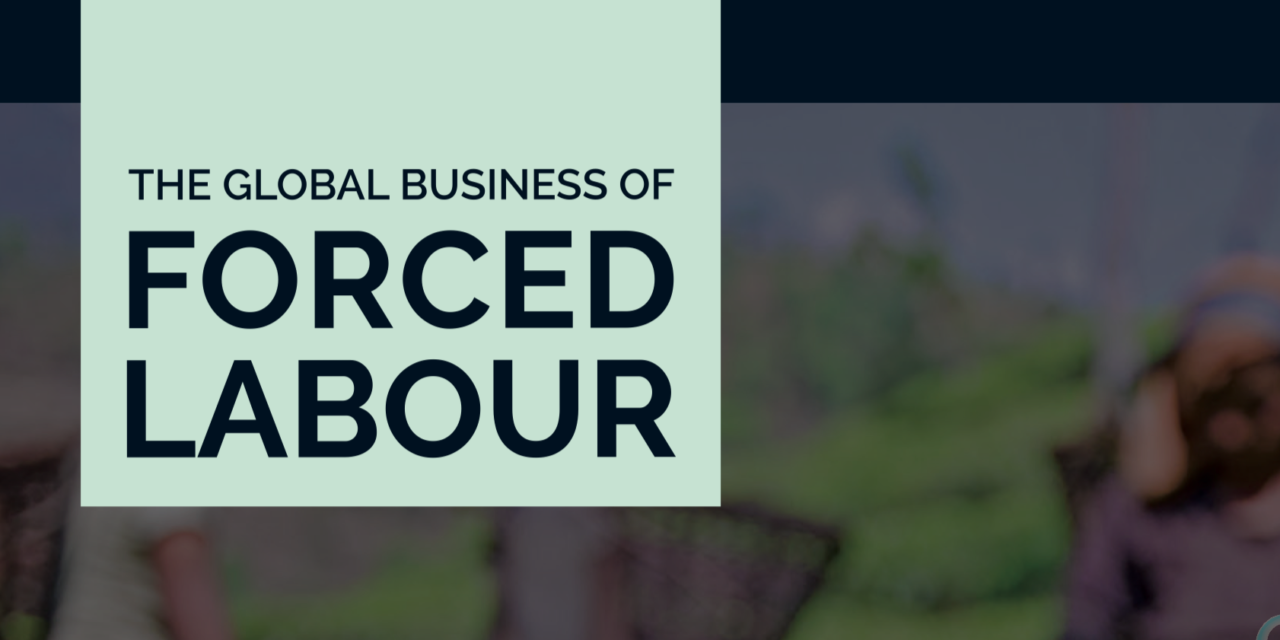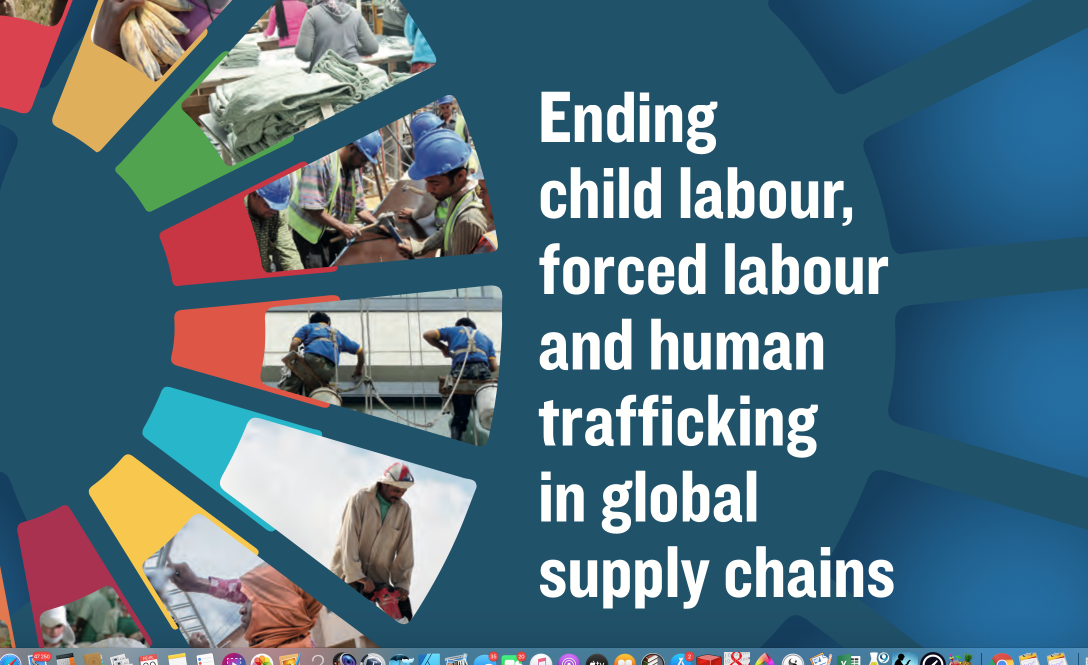http://www.globalbusinessofforcedlabour.ac.uk/
Executive Summary
About
The era of globalisation has been characterised by a growth of the world’s biggest retail and brand companies, coupled with a deepened concern regarding the presence of forced labour in global supply chains. Indeed, one of the gravest and growing risks that brand companies face is the use of forced labour, human trafficking, or other illegal labour practices within their supply chain. Research on this topic has focused almost entirely on the big brand businesses at the top of the supply chain, rather than the worksites that actually deploy and manage forced labour and exploitation, which usually involve much smaller and more informal business actors. However, the overwhelming and singular focus on multi-national corporations (MNCs) at the top of supply chains has hindered our understanding of some of the broader patterns surrounding the business dynamics of forced labour in the global economy. Designed to address this gap, the Global Business of Forced Labour project is a first-of-its kind international research study investigating the business models of forced labour in global agricultural supply chains. The project has systematically mapped the business of forced labour, focusing on case studies of cocoa and tea supply chains. Through extensive primary research in the cocoa industry in Ghana and the tea industry in India and with domestic and international business actors, the project generated an original dataset that sheds light on the drivers and patterns of forced labour in agricultural supply chains feeding UK markets. This dataset includes in-depth interviews with over 120 tea and cocoa workers, a survey of over 1000 tea and cocoa workers, and over 100 interviews with business and government actors.
Summary of Findings
Business of Forced Labour
- There is a coherent pattern of labour exploitation including forced labour at the base of global tea and cocoa supply chains.
- Tea and cocoa businesses profit from forced labour and exploitation in two main ways:
- Employers use forced labour to reduce their costs of doing business.
-
- Our research uncovers that employers systematically under-pay wages and under-provide legally-mandated essential services for workers. Employers are legally required to provide basic services for tea workers on permanent contracts and their families. However, our study found that 47% of tea workers do not have access to potable water and 26% do not have access to a toilet. Workers also reported being charged by employers for services like electricity but not receiving these.
- In the cocoa industry, employers seek to cut costs through a complex system of financial calculations, including fines (e.g. for failing to carry out mandatory unpaid labour), fees (e.g. for obtaining a job on a cocoa farm), and deductions (e.g. for costs of inputs like pesticides and safety equipment) to systematically under-pay workers and create situations of debt bondage.
- In both industries, these widespread forms of exploitation are also sometimes accompanied by physical violence, threats, verbal abuse, and/or sexual violence.
-
- Employers use forced labour to generate revenue.
- In the tea industry, employers seek to generate revenue by lending money or providing services to workers and charging high interest on debts, thus engendering situations of debt bondage. Situations of debt bondage are closely linked to the under-provision of services; most tea workers reported borrowing money to pay for food or medical care (which employers are legally required to provide).
- In the cocoa industry, employers seek to profit by forcing workers to carry out additional labour beyond the agreed terms and conditions of the work, such as working for free on the employer’s other farmlands for periods as long as three months. Failure to perform this involuntary labour results in deductions from the worker’s wages, fines, threats, or even dismissal.
- In both industries, these widespread forms of exploitation are also sometimes accompanied by physical violence, threats, verbal abuse, and/or sexual violence.
- Employers use forced labour to reduce their costs of doing business.
- Workers face severe constraints on their ability to exit exploitative tea plantations and cocoa farms.
- Although chocolate and tea companies are highly profitable, the tea and cocoa workers at the base of their supply chains are living far below the poverty line and are routinely subjected to abuse. According to the World Bank, the poverty line for lower middle-income countries such as Ghana and India is $3.20 (£2.35) per day. Tea workers’ wages in India are as low as 25% of the poverty line amount and cocoa workers’ wages are around 30% of the poverty line amount.
- Producers – tea plantation owners and cocoa farmers – claim they do not receive enough payment for their products to obey labour laws and pay the minimum wage.
Gaps in Global Supply Chain Governance
- Tea and cocoa supply chains are already covered by several prevailing government and industry initiatives to address and prevent forced labour in global supply chains. Our research confirmed that these solutions are falling short of their goals.
- Ethical certification schemes are largely ineffective in combatting labour exploitation and forced labour in tea and cocoa supply chains.
- Our study included tea plantations certified by Fairtrade, Rainforest Alliance, Ethical Trade Partnership, and Trustea, and cocoa producers who are members of the Fairtrade and UTZ certified co-operative, Kuapa Kokoo. These schemes set standards around basic services, fair treatment, wages and debt, health and safety, and workers’ rights. However, we found that these standards are routinely violated by employers.
- Overall, we found that certification had little to no impact on labour standards within the tea industry. Some of the worst cases of exploitation documented within our research occurred on ethically certified plantations.
- Workers told us that they are instructed to alter their working practices (e.g. in relation to safety equipment) to meet standards during annual audits by certifiers, but are then asked to revert to breaking standards the following day, suggesting that producers are cheating audits and inspections.
- Most workers in our study did not know whether or not they worked on certified worksites. In cocoa, 95% of workers did not know whether their worksite was certified or not. We also found extensive confusion amongst producers about how certification operates and whether or not they were certified. One producer reported that the labour standards for his farm’s certified and non-certified bags of cocoa are the same.
- Ethical certification schemes tend to contain loopholes that create exceptions related to the most vulnerable workers within each industry. For example, in cocoa, some certifiers do not include hired labour in their assessment standards, that is, workers employed by farm owners to work on a seasonal, contract, or daily basis. As one certifier explained, hired labour in cocoa is ‘an area where I would say no standard can really reach as of now’.
- When interviewed about these gaps and challenges, certifiers repeatedly claimed that their standards do not provide a guarantee that they are being met. According to one certifier, ‘there is no guarantee. We don’t use the word guarantee’. In this light, the way ethical certification schemes are portrayed to consumers needs to be revisited.
Recommendations
- Policymakers, business actors, and civil society should recognise that the business dynamics of forced labour cannot be understood through a criminal justice lens. Rather than resulting from a few ‘bad apple’ employers, the business of forced labour is widespread at the base of global supply chains and is bound up with broader structural dynamics that create a business demand for labour exploitation.
- Policymakers, business actors, and civil society should appreciate that the business of forced labour is driven by uneven value distribution along supply chains, including the low prices that producers receive for their products compared to the high profits of retail and brand firms, as well as irresponsible purchasing practices. Unless these core drivers of forced labour are tackled, efforts to address forced labour in supply chains are likely to fall short.
- At present, prominent initiatives to address forced labour in supply chains are falling short of their claims and objectives. Most are not tackling the root causes of forced labour. Government, industry, and workers’ organisations should take stock of these failings and collaborate towards stronger state and worker-led regulatory initiatives that address the root causes of forced labour in global agricultural production. These should centre around:
- Ensuring living wages for workers across all tiers of the supply chains;
- Worker-driven corporate social responsibility programs that give workers a central and meaningful role in solutions to the problem of forced labour in supply chains;
- Stronger state-based enforcement of labour standards;
- Redistribution of value along the supply chain.
Targeted recommendations for policymakers, business, and certification organisations are laid out in a policy briefs series that accompanies this report.


























